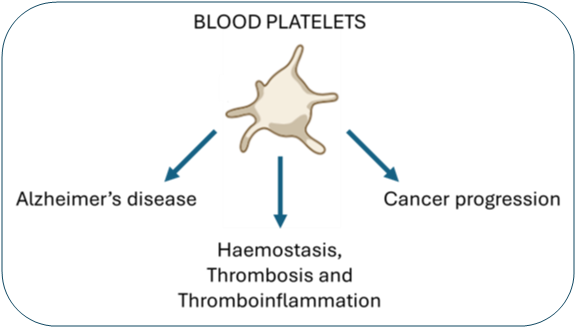The molecular basis of blood platelets function in physiological and pathological conditions
The molecular basis of blood platelets function in physiological and pathological conditions
Research Group: Ilaria Canobbio, Gianni Guidetti, Marta Zarà, Mauro Torti

Circulating blood platelets play a crucial role in haemostasis, thrombosis, but also in additional processes such as inflammation, neurodegeneration, and cancer metastasis. Understanding the exact contribution of platelets to these events is a big challenge for the future and may provide promising opportunities in biomedicine. Our research activity focuses on the following topics:
1) Platelet signal transduction pathways in haemostasis, thrombosis and thromboinflammation. The understanding of the mechanisms supporting platelet activation is critical for the identification of novel pharmacological targets for thrombotic diseases and chronic inflammation. Two signalling proteins that support platelet activation are currently under investigation in our lab: the receptor CD93 and the tyrosine kinase Pyk2.
2) Amyloid precursor protein (APP) metabolism and function in platelets: a novel link between cardiovascular and Alzheimer’s disease (AD). AD is characterized by the accumulation in brain of peptides deriving from APP. Platelets express high levels of APP and release amyloid peptides in the circulation. We use both in vitro and in vivo approaches to understand the effects of amyloid peptides in plasma, the role of platelet-derived amyloid peptides in AD onset and progression and the contribution of APP in platelet physiology and in haemostasis.
3) Contribution of platelets and platelet-derived extracellular vesicles to cancer progression. Platelets are key players in cancer spread and inhibition of platelet activation could represent a novel approach to control metastasis. We aim to understand the molecular mechanisms of the contribution of platelets to cancer spread, focusing on the role of platelet-derived extracellular vesicles, which are released upon platelet activation and represent important carriers of biological signals.
Recent Publications:
- Trivigno SMG, Vismara M, Canobbio I, Rustichelli S, Galvagni F, Orlandini M, Torti M, Guidetti GF. The C-Type Lectin Receptor CD93 Regulates Platelet Activation and Surface Expression of the Protease Activated Receptor 4. Thromb Haemost. 2024;124(2):122-134.
- Vismara M, Manfredi M, Zarà M, Trivigno SMG, Galgano L, Barbieri SS, Canobbio I, Torti M, Guidetti GF. Proteomic and functional profiling of platelet-derived extracellular vesicles released under physiological or tumor-associated conditions. Cell Death Discov. 2022;8(1):467.
- Momi S, Canino J, Vismara M, Galgano L, Falcinelli E, Guglielmini G, Taranta GC, Guidetti GF, Gresele P, Torti M, Canobbio I. Proline-rich tyrosine kinase Pyk2 regulates deep vein thrombosis. Haematologica. 2022;107(6):1374-1383.
